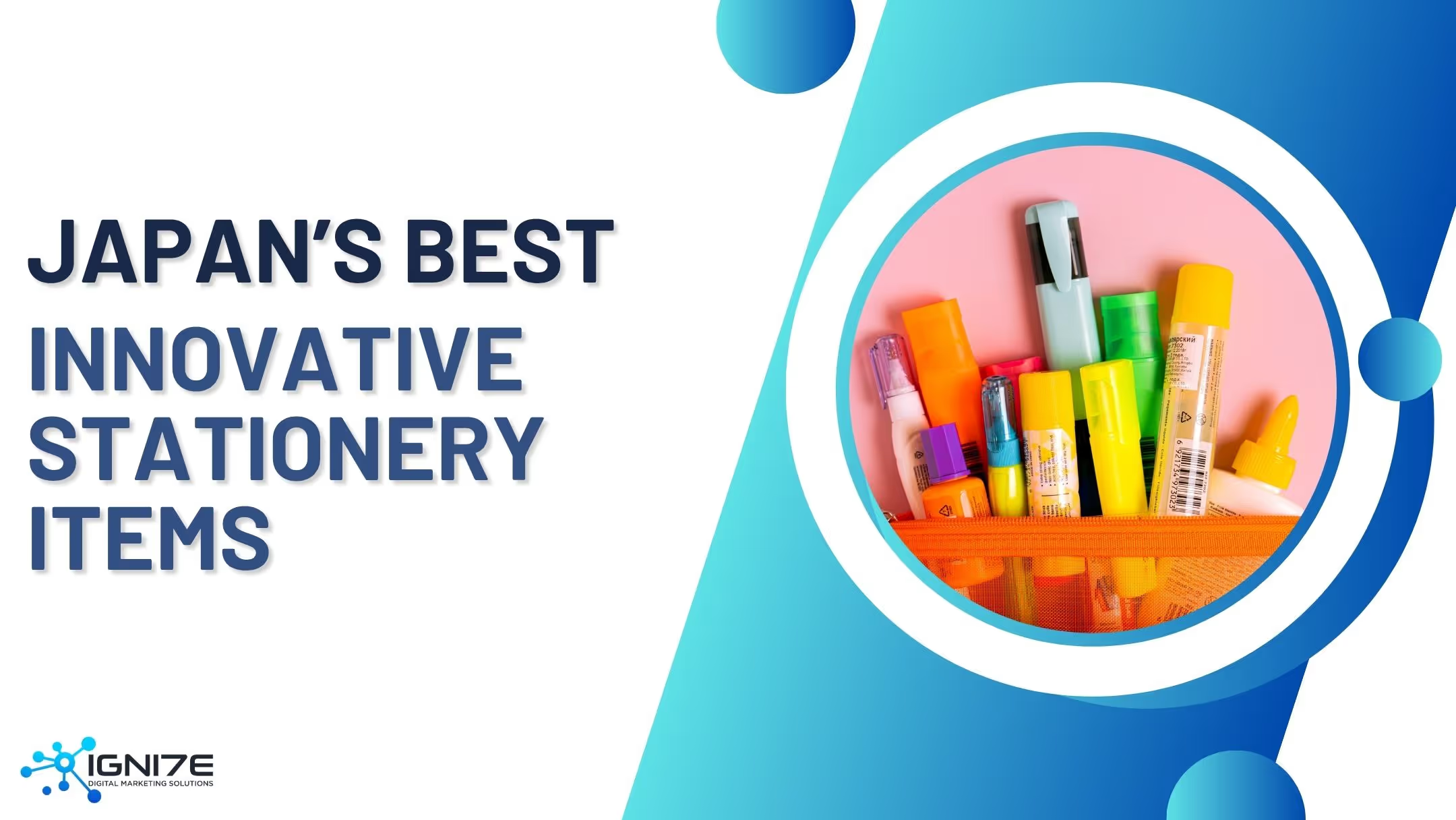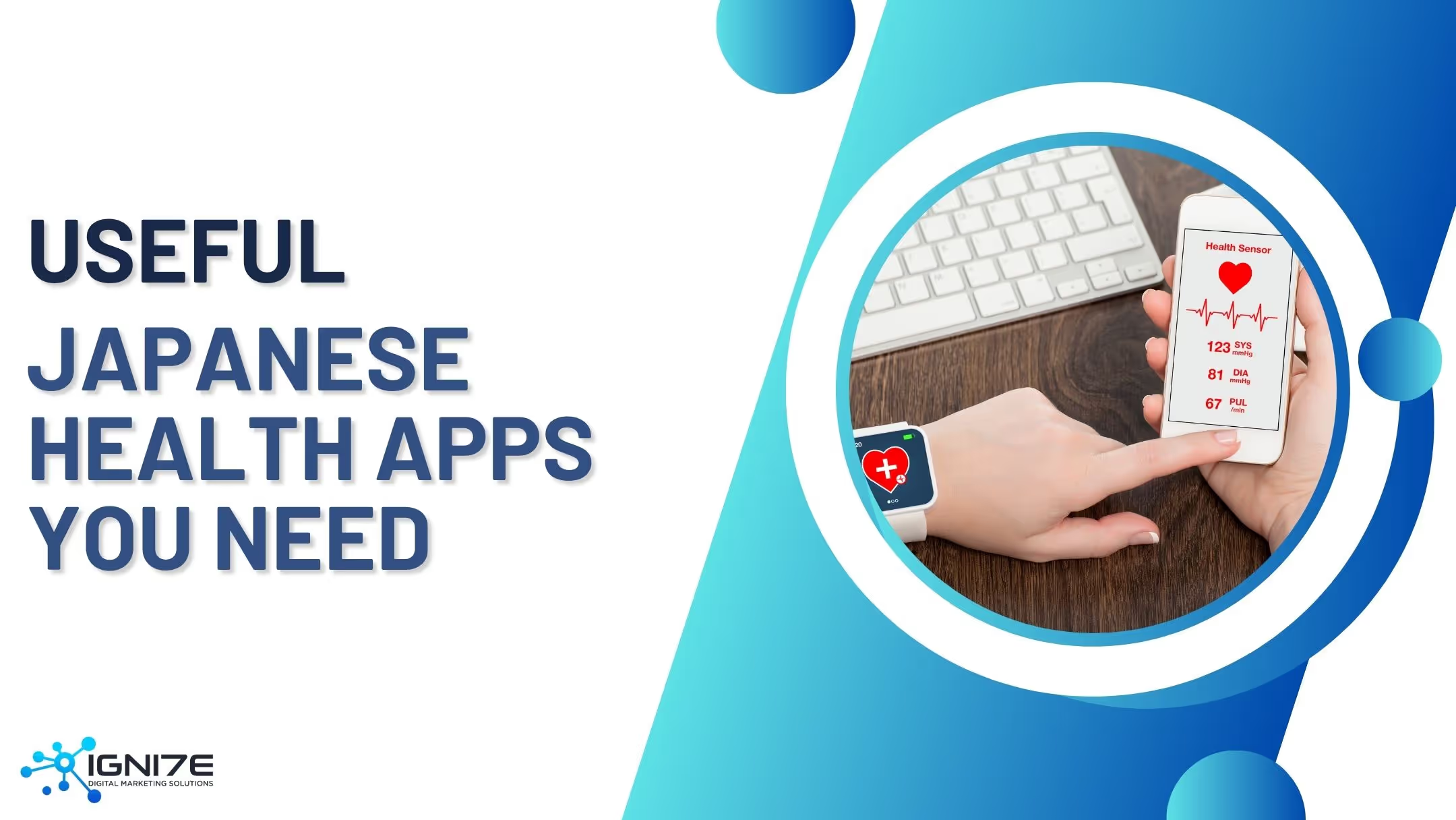Navigating Business Culture in Japan: A Guide for Foreign Enterprises
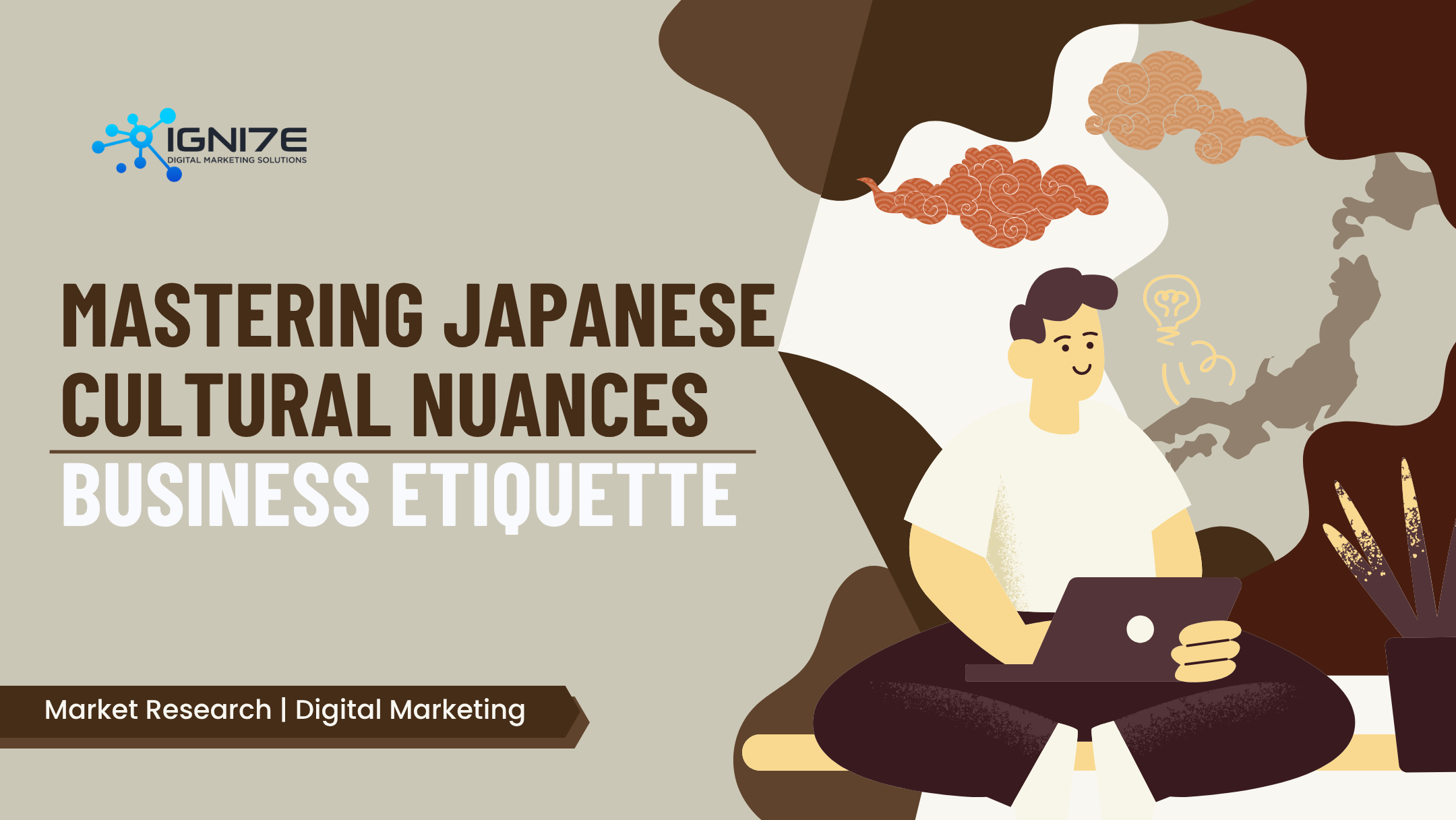
Navigating business culture in Japan requires more than just language proficiency; it demands a nuanced understanding of customs and etiquette deeply rooted in tradition. Every interaction reflects profound cultural values, from intricate greetings and the exchange of business cards to the subtleties of attire and hierarchical respect. For foreign companies looking to start or expand a business in Japan, mastering these cultural dynamics is just as important as understanding the legal and operational requirements. This guide will delve into these nuances, offering invaluable insights to help foreign enterprises thrive in Japan's unique business landscape.
Introduction to Japanese Business Culture
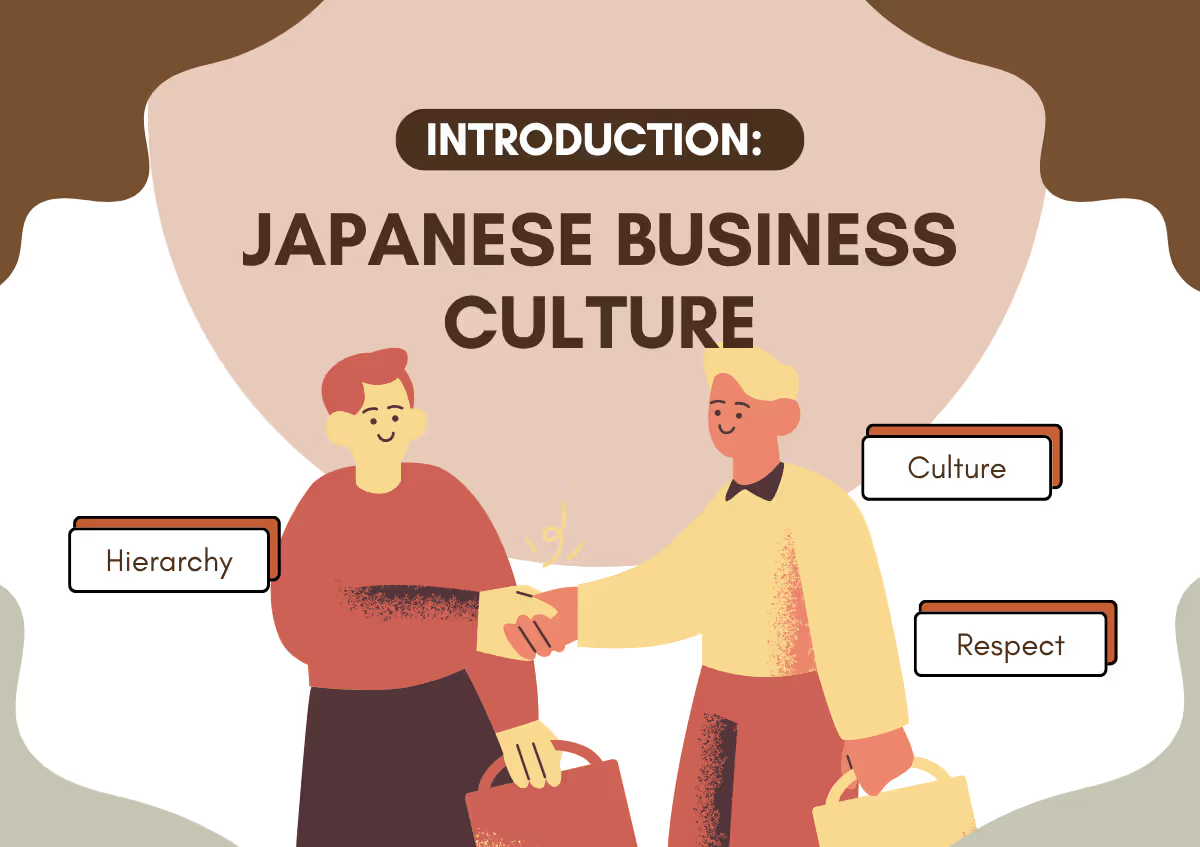
Japanese business culture, shaped by centuries of tradition and societal norms, remains a cornerstone of Japan's economic identity. With a profound emphasis on respect, hierarchy, and harmony, business practices in Japan reflect a unique blend of modern efficiency and traditional customs. For this reason, cultural awareness is paramount when navigating Japan's intricate business landscape, where rituals like exchanging meishi (business cards) symbolize mutual respect and formality. Historical influences, including Confucian principles, continue to underpin Japan's business ethos, emphasizing loyalty, honor, and duty.
These same cultural values extend into consumer behavior, particularly on social media. In Japan, influencers often gain trust not through personal branding alone but through association with reputable agencies or established brands—mirroring the importance of status and affiliation in business settings. Japanese society tends to be trend-sensitive and group-oriented, meaning that once a new product, style, or behavior gains traction, it can quickly go mainstream. As a result, influencers wield significant sway in setting trends, and campaigns that respect cultural nuances while tapping into current social buzz are more likely to succeed.
Understanding these nuances and the key features of Japan's business culture is essential for foreign enterprises aiming to establish a presence in the country's competitive market. It requires adapting to local customs while bridging cultural differences to build trust and foster successful collaborations. For those embarking on business ventures in Japan, embracing these traditions offers invaluable insights and enhances prospects for long-term success.
Historical Influence on Japanese Business Culture
The evolution of Japanese business culture reflects a rich tapestry woven from historical isolation and the profound influence of indigenous philosophies like Shinto and imported teachings such as Confucianism and Buddhism. Shinto, rooted in communal harmony and reverence for nature, instills a collective mindset that prioritizes the community's well-being over individual interests. Meanwhile, Confucian principles emphasize hierarchical order and the importance of interpersonal relationships, fostering loyalty, respect, and duty within Japanese society.
Buddhism contributes to Japan's ethical framework, promoting compassion and the interconnectedness of all beings. Together, these philosophies form the bedrock of Japanese business practices, shaping etiquette, decision-making processes, and organizational structures. The hierarchical nature of Japanese businesses, while occasionally challenging, establishes clear lines of authority and accountability, facilitating efficient operations and fostering mentorship opportunities for career development. By embracing these cultural foundations, foreign enterprises can navigate Japan's business environment with cultural sensitivity, building trust and cultivating enduring partnerships in this dynamic market.
Recognizing Cultural Differences Between Overseas and Japan
Recognizing and appreciating cultural differences between global and Japanese business practices is fundamental to fostering successful business interactions. In Japan, cultural sensitivity entails grasping subtle aspects like hierarchical norms, nuances in communication style and etiquette, and the several rituals of exchange such as giving gifts and presenting business cards. These customs are rooted in profound values of respect, harmony, and the collective spirit ingrained in Japan's business culture.
By embracing cultural sensitivity, businesses showcase their respect for local traditions while significantly improving their ability to communicate effectively and build meaningful relationships. Adapting to Japan's business culture enables foreign enterprises to navigate potential misunderstandings more easily, establishing a foundation of trust essential for successful negotiations and collaborations. This approach facilitates immediate business goals and lays the groundwork for sustainable, long-term partnerships in Japan's competitive market. Ultimately, integrating cultural awareness into business strategies enhances operational efficiency and reinforces the overall business presence in Japan, ensuring enduring success in the dynamic local business environment.
Want to take your localization strategy even further? Learn how to adapt your digital presence with our blog: Optimizing Your Website for Japanese Audiences: Key Translation Strategies. Discover how translation, transcreation, and copywriting can help your brand truly connect with local consumers.
Respect: The Foundation of Japanese Business Culture
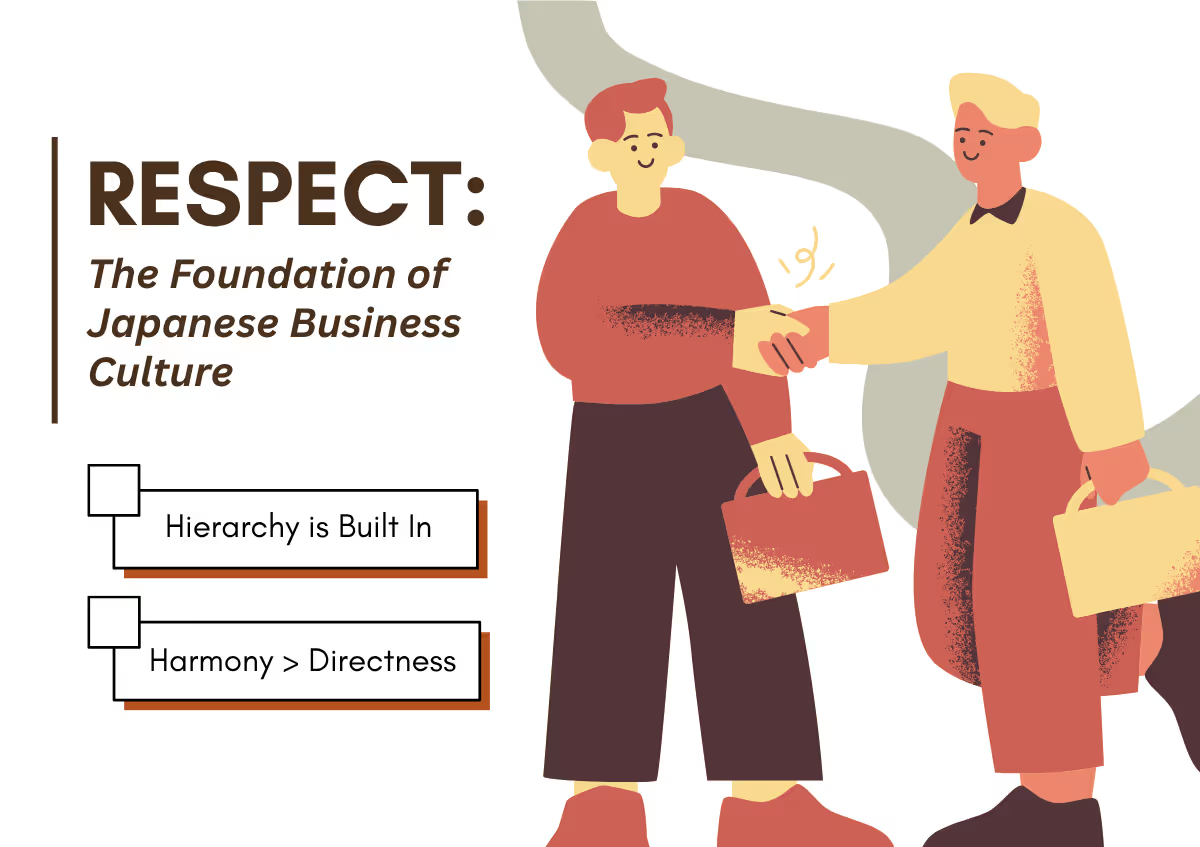
If you’re doing business in Japan, one concept is at the heart of everything: respect. It’s not just a polite gesture—it’s a guiding principle that affects how people communicate, who speaks first in a meeting, and even how decisions are made. In Japanese business culture, respect appears in obvious rituals (like bowing or business card exchanges) and subtle behaviors (like pausing before speaking or not interrupting a senior leader).
Learning how to show respect in the right ways will make your Japanese counterparts more receptive, more trusting, and more willing to work with you long-term.
Hierarchy is Built In — But Slowly Evolving
Traditionally, hierarchy has been a defining feature of Japanese business culture. Seniority — whether by age, job title, or tenure — plays a significant role in determining decisions, who speaks first, and how people interact across different levels of an organization. Respect for superiors is expressed through language, seating order, and body language such as bowing.
That said, the rigid hierarchical model is gradually changing. Younger generations and more globally integrated industries (such as tech, media buying, and startups) are adopting flatter organizational structures. In these spaces, collaboration, speed, and innovation often precede formality. While hierarchy is still present, it’s becoming more contextual than absolute.
What to do:
- Begin with formality and deference until you understand the company's culture. It's better to err on the side of respect.
- Observe how Japanese colleagues interact with each other. Do they speak casually with superiors? Do they use formal titles or more relaxed language?
- In formal corporate settings, address senior staff first, use titles with honorifics (like "-san" or "-sama" for clients), and avoid public disagreement.
- In more progressive environments, speaking more directly or participating in open discussions with senior colleagues may be acceptable. Let them set the tone.
Why this matters:
Understanding the role of hierarchy in a given company can help you avoid unintentional offense. At the same time, recognizing when the culture is more flexible allows you to adapt and build rapport more naturally. The key is to start respectfully and adjust as you learn the norms of the organization you're working with.
Harmony Beats Out Directness
Japanese business culture strongly emphasizes avoiding conflict, even at the cost of clarity. It’s not about hiding the truth but preserving group unity and relationships. This is why many Westerners are puzzled when they can’t get a firm “yes” or “no.”
In Japan,
- Disagreement is shown subtly (long silences, vagueness).
- Praise is modest, and criticism is delivered indirectly.
- “Yes” may mean “I understand,” not “I agree.”
Actions to be taken:
- Use soft, indirect language when negotiating. Try:
→ “That might be difficult on our side” instead of “That won’t work.”
- Pay attention to tone, facial expressions, and pauses — they carry weight.
- Don’t force immediate decisions. Allow space for internal discussions.
If you’re unsure what someone means, ask clarifying questions or watch what they do (pay attention to body language), not just what they say. The real message is often between the lines.
Humility Drives Japanese Business Relationships
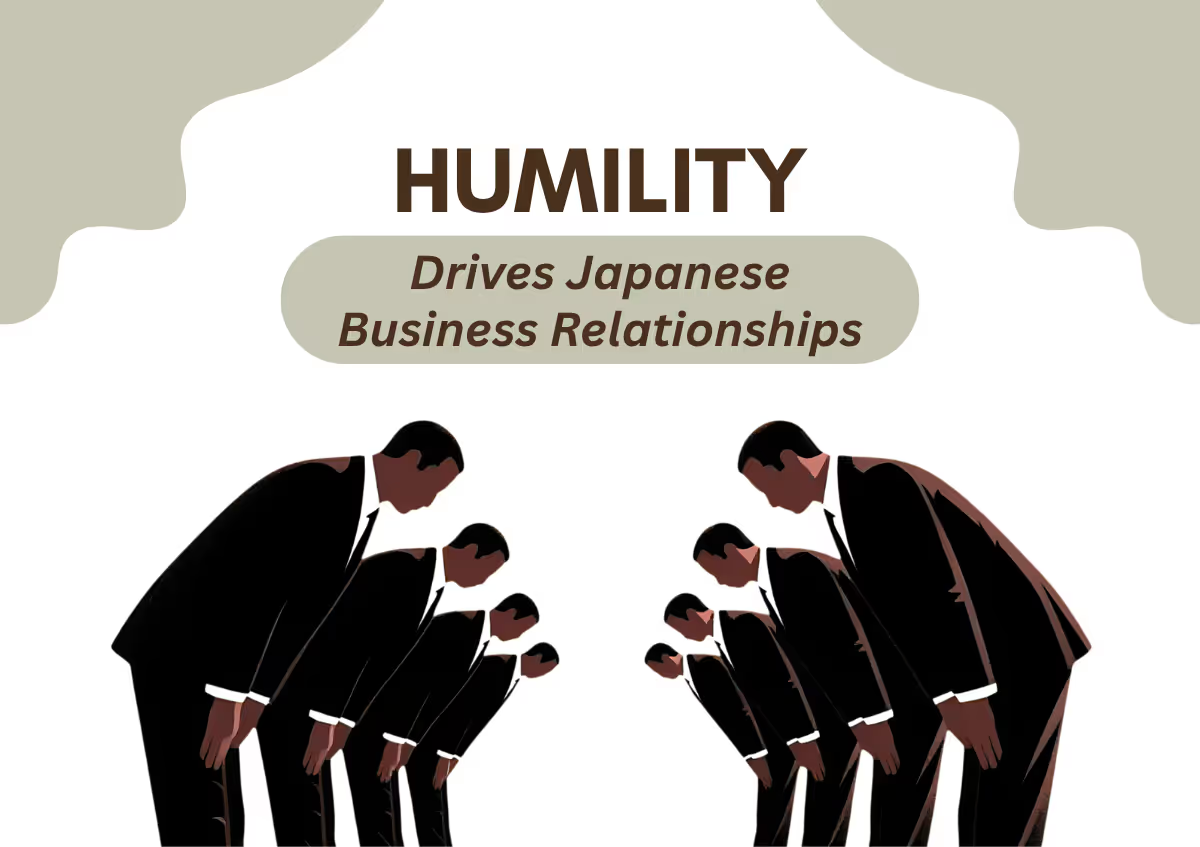
In Japan, modesty is more than a virtue — it’s a form of communication. A successful person is expected to play down their achievements and credit the group. Overconfidence, even when well-meaning, can come across as arrogance.
That’s why building strong business relationships in Japan often starts with humility. If you can show that you're reliable, thoughtful, and not self-centered, you’ll get much further than trying to impress with numbers and résumés.
Downplay Achievements, Elevate the Team
Professionals in many Western cultures, especially the U.S., are taught to "sell themselves." That approach can backfire in Japan, where self-promotion might appear boastful or insecure. The cultural default is that if you’re good, people will notice—you don’t have to say it.
For example:
- When presenting results, say:
→ “Our team managed to complete this thanks to everyone’s effort.”
- If someone compliments your work, respond with:
- → “Thank you — I couldn’t have done it without support from the team.”
- When introducing yourself, emphasize your company or role, not personal accolades.
Why this works:
Japanese culture values group success over individual glory. Showing you’re a team player, not a solo star, builds credibility and connection.
Focus on Long-Term Trust, Not Short-Term Wins
Japanese companies don’t just want a vendor or a one-off deal — they are looking for a partner. That means your first few meetings might feel like relationship-building sessions rather than hard business talks. That’s completely normal.
Why? Because in Japan, trust precedes business, not the other way around.
Recommended action steps:
- Be patient — real decisions often happen after the meeting, once internal consensus is reached.
- Follow up with personalized, polite emails or even a handwritten note.
- Don’t push for a “yes” — instead, ask if more information is needed to support internal discussion.
Your consistency matters more than your pitch. Show up on time, deliver what you promised, and be respectful in every interaction. These build shinai (信頼)—deep trust—which is the basis for long-term collaboration.
Once trust is established, Japanese partners are often extremely loyal, even through tough times. Relationships here aren’t transactional — they’re long-haul investments.
Japanese Business Etiquette That Builds Instant Respect

In Japan, first impressions carry lasting weight, and etiquette is the language through which respect is shown. Whether you’re meeting someone for the first time or deepening an ongoing partnership, how you present yourself matters as much as what you say. Three essential rituals — bowing, exchanging business cards, and gift-giving — shape every business interaction in Japan. Mastering them sets the tone for trust, professionalism, and credibility.
Bow First, Speak Second
In Japan, bowing is more than a greeting—it is a sign of respect and an acknowledgment of social or professional standing. In the workplace, bowing communicates humility, attentiveness, and cultural understanding.
There are three standard forms of bows in business settings:
Eshaku (15°): A slight bow used for casual or passing greetings.
Keirei (30°): A more profound, standard business bow appropriate when entering meetings, greeting superiors, or beginning formal discussions.
Saikeirei (45°): A deep bow reserved for sincere apologies or expressions of gratitude.
When bowing, your posture should be straight and composed. Men typically place their arms at their sides; women often fold their hands before their bodies. Eye contact should be avoided during the bow, as it can be confrontational. If in a group setting, always greet the most senior individual first.
While some Japanese professionals may be open to handshakes, it is best to wait for them to initiate. Avoid combining a handshake with a bow—choose one or the other based on the situation.
Mastering the Meishi (Business Card) Exchange
The exchange of business cards, or meishi, is a carefully observed ritual in Japanese business culture. It marks the formal beginning of a relationship and reflects the importance placed on status, role, and professionalism.
Cards should be prepared in advance, ideally with Japanese on one side and English on the other. During introductions, present your card using both hands, with the Japanese side facing up and toward the recipient. Offer a brief bow while doing so. When receiving a card, accept it with both hands and take a moment to examine the name and title printed on it.
The business card should remain on the table throughout the meeting, ideally arranged in front of you according to the seating order. Placing a card in your pocket immediately or writing on it is considered disrespectful. Cards are treated as a physical representation of the individual — handling them with care demonstrates cultural awareness and attention to professional decorum.
Give Gifts — But Do It Right
Gift-giving in Japanese business culture expresses appreciation and goodwill, not obligation. It is often used to mark the beginning of a new relationship, to celebrate a milestone, or to express thanks at the close of a project.
Gifts should be modest, thoughtfully selected, and wrapped neatly. Items from your home country or city are often well received, particularly if they reflect craftsmanship or local character. Presentation matters as much as the item itself — gifts should be handed over with both hands and a slight bow. Typically, the recipient will not open the gift in your presence, a sign of politeness and restraint.
Avoid overly expensive gifts, as they may cause discomfort or imply an expectation of reciprocation. Likewise, steer clear of culturally sensitive items, such as anything in sets of four (a number associated with death) or gifts that feel overly promotional.
Done appropriately, gift-giving becomes a quiet but meaningful gesture that affirms the relationship, reflects consideration, and communicates respect without the need for words.
Dressing for Success in Japanese Business Culture
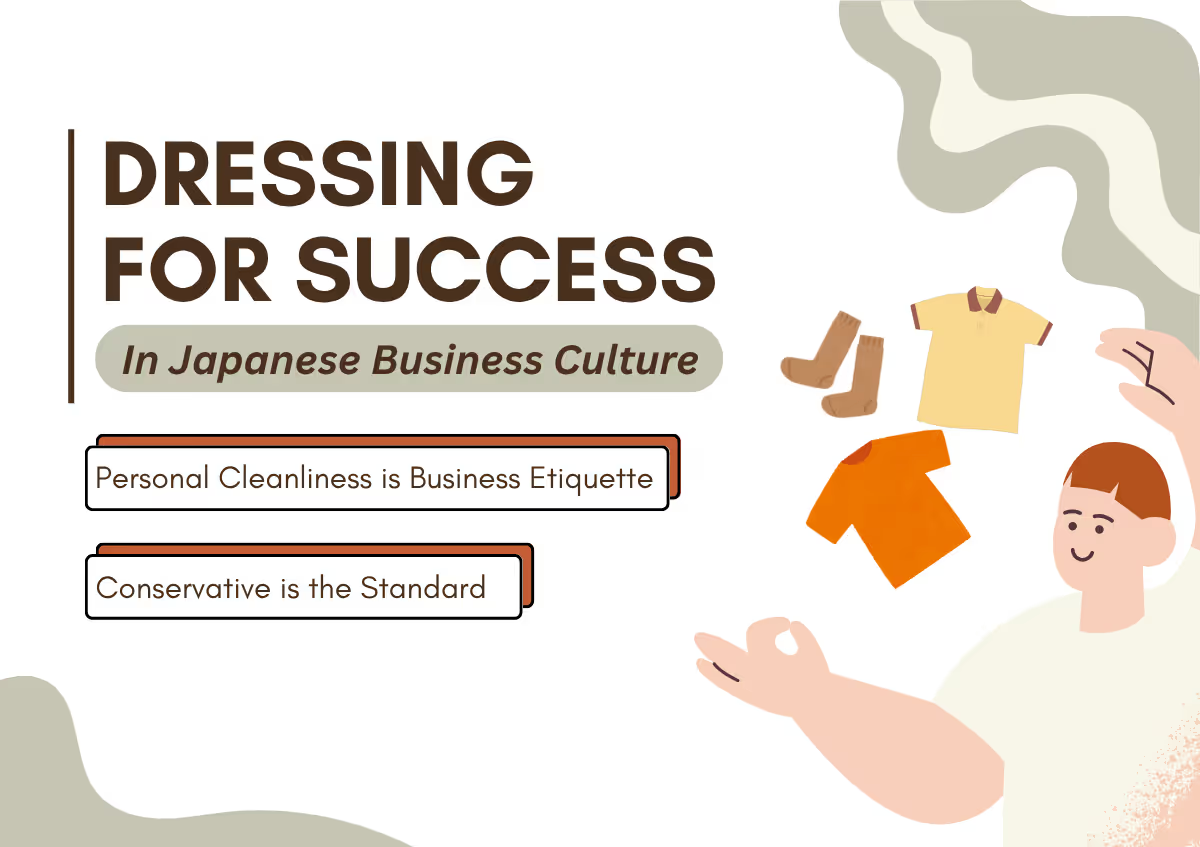
In Japan, how you dress is more than a matter of appearance — it is an outward expression of respect for those you meet. Business attire reflects not just personal professionalism, but also consideration for the people and environment around you. A clean, understated, and well-groomed appearance signals that you understand and appreciate the values of Japanese business culture, where harmony, discipline, and attention to detail are highly prized.
While some younger and international companies may adopt more relaxed standards, formal and conservative dress remains the norm in most Japanese business settings. Foreign professionals are advised to begin formally and adjust based on the workplace context.
Conservative is the Standard
In traditional Japanese business environments, one is expected to dress in a way that does not draw unnecessary attention. The emphasis is on modesty, professionalism, and unity with others, not on standing out.
Dark-colored suits, simple accessories, and muted tones are preferred. Flashy patterns, bright colors, and unconventional styles are best avoided. Dressing conservatively demonstrates your seriousness, reliability, and willingness to adapt to shared norms.
First impressions are powerful in Japan, and attire plays a key role in forming them. Even before you speak, your clothing communicates whether you’ve come prepared, not just for business but also for cultural engagement.
Personal Cleanliness is Business Etiquette
Cleanliness in Japan is closely tied to social responsibility. Being well-groomed is not only a personal matter but a sign of consideration for others. A tidy, hygienic appearance suggests respecting your surroundings and the people in them.
This cultural standard extends well beyond appearance. For instance, it’s customary to remove your jacket before entering a building so as not to disrupt the entryway, and shoes are removed in many settings where slippers are provided. In the summer, wearing socks with sandals is recommended to avoid going barefoot when removing shoes.
Other expected practices include:
- Keeping nails trimmed and clean
- Maintaining a subtle, neutral scent (or no scent at all)
- Wearing a face mask if you are unwell
- Avoid eating or drinking on the street, particularly in professional contexts
Grooming and hygiene are not treated as superficial habits in Japan. They are fundamental expressions of respect for the workplace, your colleagues, and shared space.
Business Dress Code for Men and Women

While there is a shared standard of neatness and professionalism across all genders, expectations for business attire in Japan differ slightly for men and women.
For Men:
- A well-fitted, dark suit (typically navy or charcoal) is standard.
- White or light-colored shirts with a conservative tie.
- Hair should be neatly trimmed; facial hair is generally minimal or clean-shaven.
- Jewelry is kept to a minimum, usually just a watch.
For Women:
- Dark or neutral-colored business suits, with either a skirt or pants.
- Skirts should fall below the knee; blouses should be modest and without flashy patterns.
- Hair should be tidy and professional; longer styles are often tied back.
- Makeup is expected to be natural and understated.
- Shoes are typically low-heeled, closed-toe, and polished.
In both cases, the emphasis is on being clean, modest, and orderly, not fashionable or expressive. A polished appearance is still expected even in industries where formal attire is not strictly required. Following these guidelines demonstrates cultural sensitivity and helps establish credibility from the outset.
Japanese Business Meetings: How to Show Up and Win Trust
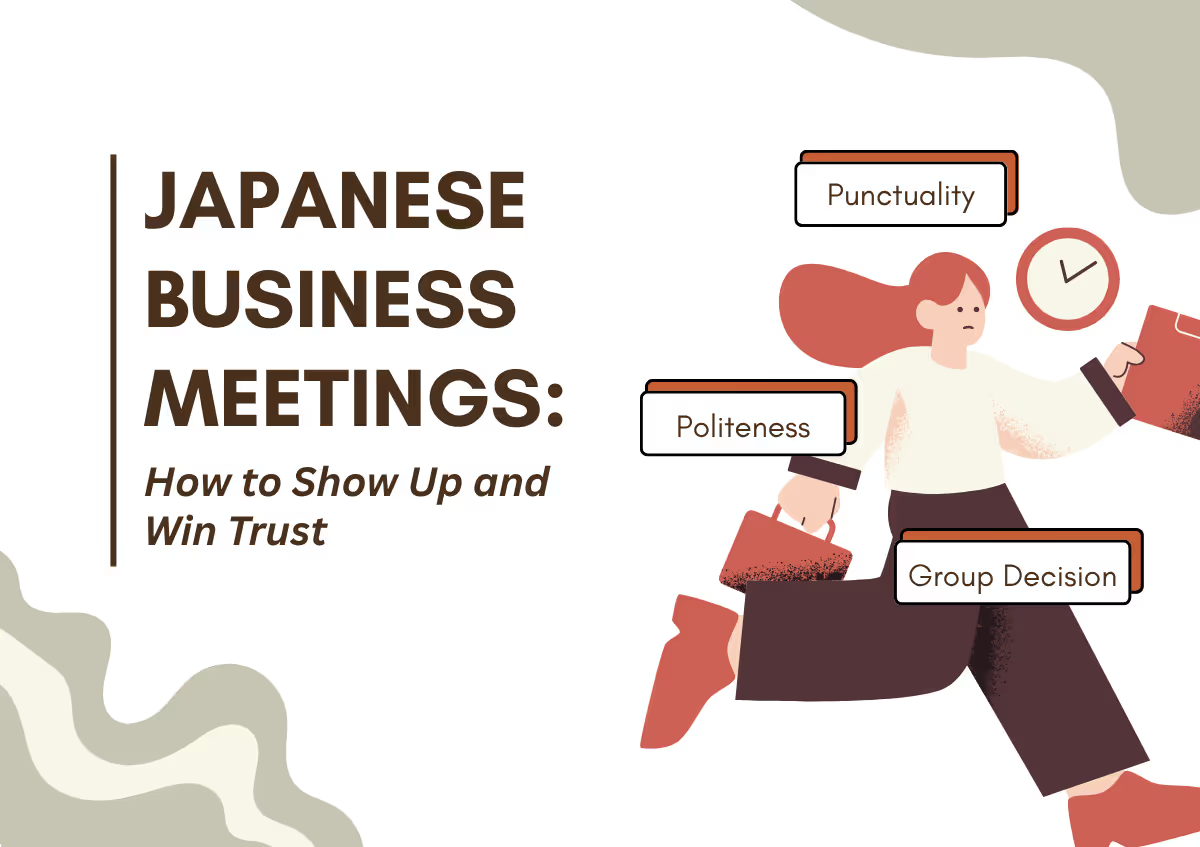
In Japan, business meetings are not just transactional events but carefully structured interactions that build mutual understanding and long-term trust. How you prepare, how you speak, and how you respond in the meeting room will shape not only the outcome of a single conversation but your broader relationship with a company or client.
Japanese meetings tend to be formal, intentional, and methodical. Rather than driving toward quick decisions, they prioritize clarity, alignment, and respect. For foreign professionals, knowing how to conduct yourself in these settings is essential to establishing credibility and earning the trust that Japanese business culture values so highly.
Punctuality is Non-Negotiable
Being on time in Japan means being early. Punctuality is not simply good manners — it is a form of respect. When you arrive promptly for a meeting, you demonstrate that you value the other party’s time and take the engagement seriously. On the other hand, arriving even a few minutes late can be seen as a sign of disorganization or indifference.
Public transportation in Japan is famously reliable, and people are expected to plan accordingly. Delays are rarely tolerated, and there is little room for excuses.
Key points:
- Plan to arrive at least 10–15 minutes early.
- If you're running even slightly behind, notify your counterpart as soon as possible.
- If possible, take your coat off before entering the office or building, as doing so in the lobby may be seen as inconsiderate to others using the space.
Respect for time begins before the meeting starts. Being early allows you to settle in, review your materials, and prepare to make the right impression.
Speak with Intention and Politeness
In Japanese business communication, the tone and structure of your speech carry as much weight as the content. Conversations tend to be formal and measured. Interruptions are rare, and assertiveness is often replaced with subtlety. Even in English-language meetings, directness should be softened, and casual expressions should be avoided.
General guidelines:
- Speak clearly, slowly, and with purpose — especially if language is a barrier.
- Avoid slang, idioms, or humor that might not translate well.
- Show deference using titles and surnames, followed by the honorific “-san” (e.g., Tanaka-san).
- It is common for Japanese participants to take extensive notes, and pausing to allow space for writing or translation is appreciated.
It’s also important to be aware of nonverbal cues. Japanese professionals may avoid expressing disagreement directly. Long silences, vague responses, or gentle redirection may signal hesitation or disapproval. If you sense uncertainty, don’t press for clarification on the spot—give your counterpart time to reflect and follow up later if needed.
Understand Group Decision-Making— And Where Creativity Fits In
Japanese business meetings are often centered around building consensus rather than securing immediate decisions. Rather than relying on a single leader to make a call on the spot, companies typically involve several stakeholders in a deliberate internal process. This approach helps ensure everyone is aligned before moving forward, but it also means decisions can take longer.
For foreign professionals, this can be unfamiliar. However, understanding and adapting to this rhythm is key to building trust. Meetings may end without a clear outcome — not because the proposal was rejected, but because the group needs time to discuss it privately and thoroughly.
That said, this preference for process and alignment does not mean Japanese companies are risk-averse or resistant to change. Many are eager to engage with creative, outside-the-box thinking, especially when it is presented thoughtfully and with respect for the local context. Japan has long been known for its openness to innovation, and foreign companies that bring fresh perspectives, proprietary technology, or new business models can find strong partners here.
A few things to keep in mind:
- Present innovative ideas clearly and with structure; avoid improvisation.
- Frame creativity as a solution to a shared challenge, not a disruption.
- Be ready to support new concepts with detailed materials, case studies, or demonstrations.
- Give decision-makers time to reflect and discuss proposals internally — this shows respect for their process and increases the likelihood of a positive response.
Creativity is welcome in Japanese business, but it works best with cultural awareness, preparation, and patience.
Japanese Business Communication: Language, Titles, and Tone
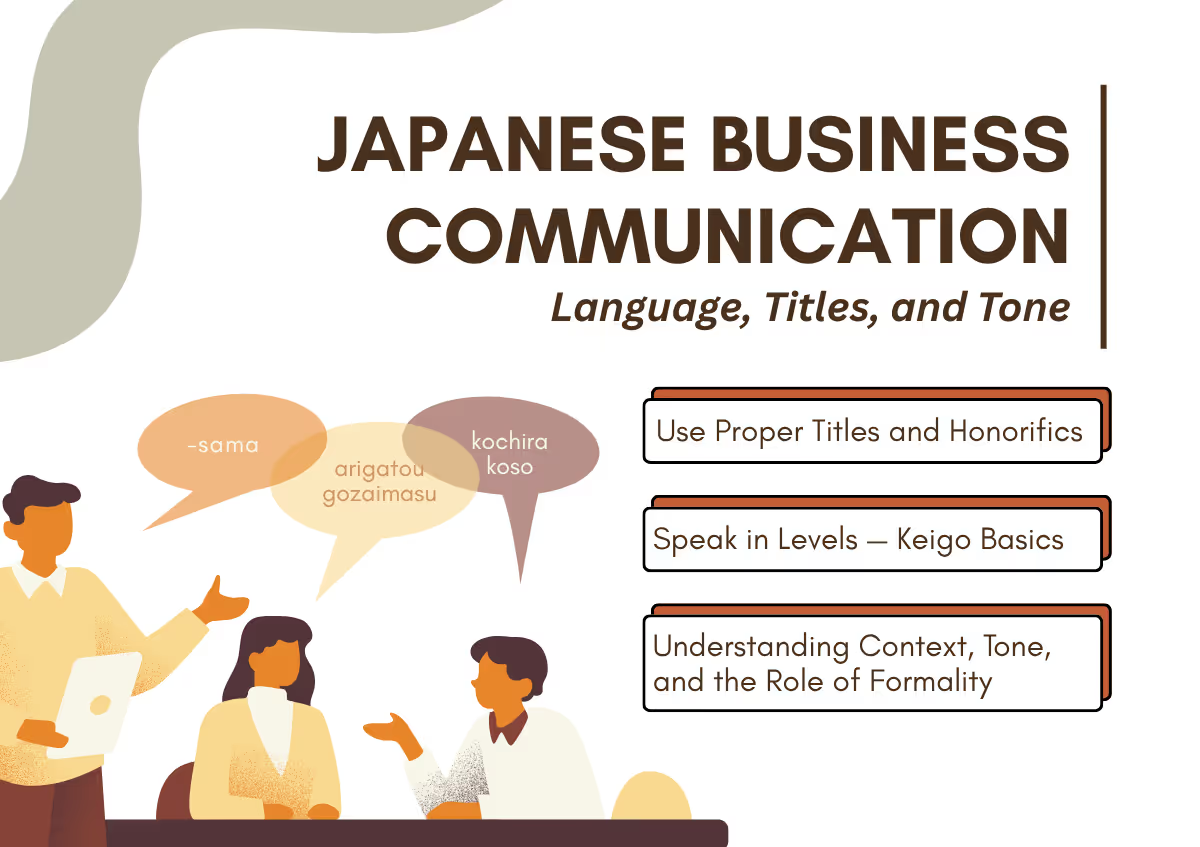
Japanese business communication is governed by formality, subtlety, and a deep sense of respect. Language is not only a tool for information-sharing — it’s a reflection of relationship dynamics. The way you speak to a client, a colleague, or a senior leader communicates much more than content; it reveals how well you understand the values of hierarchy, humility, and harmony that underpin Japanese corporate culture.
To communicate effectively in Japan, it's important to understand not only what to say but also how to say it—and when to say less.
Use Proper Titles and Honorifics
In Japan, how you address someone is almost as important as what you say. Titles and honorifics are essential in acknowledging rank, status, and relationships. Properly using them demonstrates not just politeness but also cultural fluency that helps establish trust.
The most commonly used honorific is -san, which is attached to the person’s family name (e.g., Tanaka-san). This is appropriate for clients, colleagues, and even superiors in most business contexts. However, other honorifics signal deeper levels of respect:
-sama is used for customers, clients, or high-ranking individuals. It expresses a high degree of formality.
-sensei may be used for professionals such as doctors, lawyers, or professors.
-kun or -chan are informal and generally avoided in professional settings unless addressing subordinates in a familiar context.
A few essential principles:
- Always use a person’s last name with the appropriate honorific.
- Avoid using first names unless invited to do so — even among peers.
- When discussing someone in your company with an external party, drop the honorific to signal your alignment with the listener’s perspective (e.g., referring to your manager simply as “Kobayashi”).
This level of linguistic awareness is more than etiquette — it signals alignment with the nuanced social structure of Japanese business.
Speak in Levels — Keigo Basics
Japanese business language is stratified into three primary levels of formality, collectively known as keigo (敬語). Understanding when and how to use each form is essential for navigating professional interactions, especially when dealing with clients, senior staff, or unfamiliar partners.
- Teineigo (丁寧語) — Polite Language
This is the standard polite form and the safest default for most business situations. It includes basic conjugations such as “desu” and “masu” and can be used with colleagues, clients, or anyone with whom you don’t have a close relationship.
Example:
- “Arigatou gozaimasu” instead of “Arigatou”
- Sonkeigo (尊敬語) — Respectful Language
Sonkeigo is used when speaking about the actions of someone above you, such as a client or superior. It elevates their status and shows deference.
Example:
- “Irasshaimasu” (to go/come/be present) instead of “kimasu” or “imasu”
Use this form when referring to a client’s visit, a manager’s decision, or a senior executive’s comments.
- Kenjougo (謙譲語) — Humble Language
Kenjougo is the opposite of sonkeigo. It is used to lower one's own position when referring to one's actions, expressing humility and putting the other party above oneself in the social hierarchy.
Example:
- “Moushimasu” instead of “iimasu” (to say)
- “Itashimasu” instead of “shimasu” (to do)
Use this form when speaking about your efforts, offers, or services concerning a client or superior.
Understanding Context, Tone, and the Role of Formality
Beyond vocabulary and grammar, communication in Japanese business culture is shaped by how things are said — and just as importantly, what is left unsaid. Conversations are often indirect, with speakers softening their opinions, avoiding firm assertions, and leaving space for interpretation. This approach helps maintain social harmony and allows all parties to navigate complex dynamics with subtlety and care.
Tone and delivery are critical. Interruptions are uncommon, and silence is not necessarily a sign of discomfort. It may reflect thoughtfulness, hesitation, or respectful consideration. Similarly, disagreement is rarely expressed outright. Instead of saying “I disagree,” a Japanese counterpart might say, “That may be a little difficult,” signaling concern without confrontation.
Formality in language also plays a central role. The level of politeness in your communication—whether in person or over email—is a direct reflection of the respect you show. Using formal structures, structured greetings and closings, and avoiding overly casual phrases or humor are all signs that you understand the environment's expectations.
Some general principles to follow:
- Allow time for silence and do not rush to fill conversational gaps.
- Express disagreement indirectly and with tact.
- Avoid slang, colloquialisms, and idiomatic expressions.
- Maintain a formal tone in professional correspondence, especially with new contacts or senior individuals.
Even in companies with more relaxed internal cultures, it’s best to begin with formality and adjust based on cues from your counterpart. Overfamiliarity too early can be seen as presumptuous, while formality is rarely considered inappropriate.
Ultimately, Japanese business communication is less about efficiency and more about the quality of interaction. A careful, respectful approach signals professionalism, cultural awareness, and a willingness to engage on local terms — qualities often valued as much as business results.
Japanese Business Culture After Hours: Drinking and Socializing
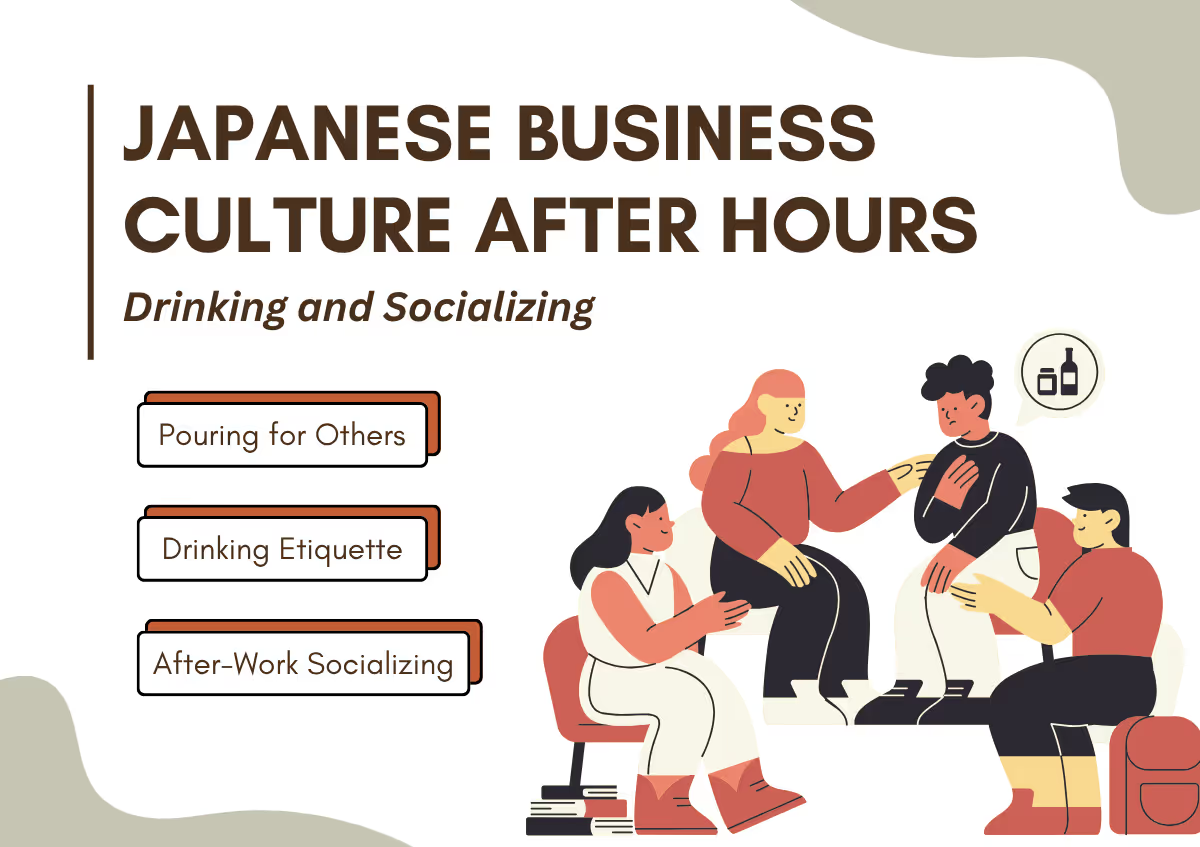
While formal meetings and structured presentations lay the groundwork for professional relationships in Japan, many meaningful business connections are strengthened in more relaxed, after-hours settings. These social gatherings—often involving food and drinks—are not strictly part of the job, but they are critical to building rapport, mutual understanding, and long-term trust.
In Japan, communication is not confined to office hours. Whether it's a simple dinner or a nomikai (drinking party), participating in social settings demonstrates openness and a willingness to personally engage with colleagues and partners.
Nomikai Etiquette (Social Drinking)
A nomikai (飲み会) refers to an informal gathering over drinks, typically among coworkers or business partners. It is not only a chance to unwind but a space where hierarchical roles soften and more candid conversations can take place. While not mandatory, being present and observing the proper etiquette is often appreciated and can go a long way in building trust.
A few key practices define proper conduct at a nomikai:
Pouring for others: It’s customary to pour drinks for others, especially senior colleagues, rather than serving yourself. Wait for someone to pour your drink, and reciprocate the gesture. This small ritual reflects attentiveness and mutual respect.
Pace and moderation: While drinking is common, overindulgence is discouraged. Maintain composure and be mindful of the atmosphere — the goal is to connect, not to drink excessively.
First-toast etiquette: Don’t start drinking until everyone is served and someone proposes a toast, typically with the word “kanpai” (“cheers”).
Paying the bill: The most senior person often covers the cost, or the group may split it evenly. Follow the lead of your host, and be discreet when offering to contribute.
Although these gatherings are typically light-hearted and informal, they still follow unspoken rules of decorum. Observing them shows cultural sensitivity and helps colleagues see you not only as a professional but also as a respectful and approachable person.
After-Work Socializing is Part of the Job
While the traditional view of after-work gatherings as a “required part of the job” has softened recently, especially among younger professionals, many Japanese companies still value informal interaction outside office hours. These events provide space for deeper, more authentic communication that may not happen during formal meetings.
Topics at these gatherings often shift from business to personal interests, daily life, or shared experiences. This helps humanize the relationship and lays the foundation for long-term collaboration based on familiarity and trust.
What to keep in mind:
- It’s acceptable—and increasingly common—to politely decline invitations if needed. Expressing appreciation and offering to join next time maintains goodwill.
- If you attend, be present. Show interest, listen actively, and engage sincerely in conversation.
- Business may come up, but it’s best not to steer the conversation in that direction unless prompted.
Ultimately, after-hours socializing in Japan offers an opportunity, not an obligation. Participating when appropriate and showing curiosity about your colleagues as people, not just professionals, can deepen relationships meaningfully.
Do’s and Don’ts of Doing Business in Japan
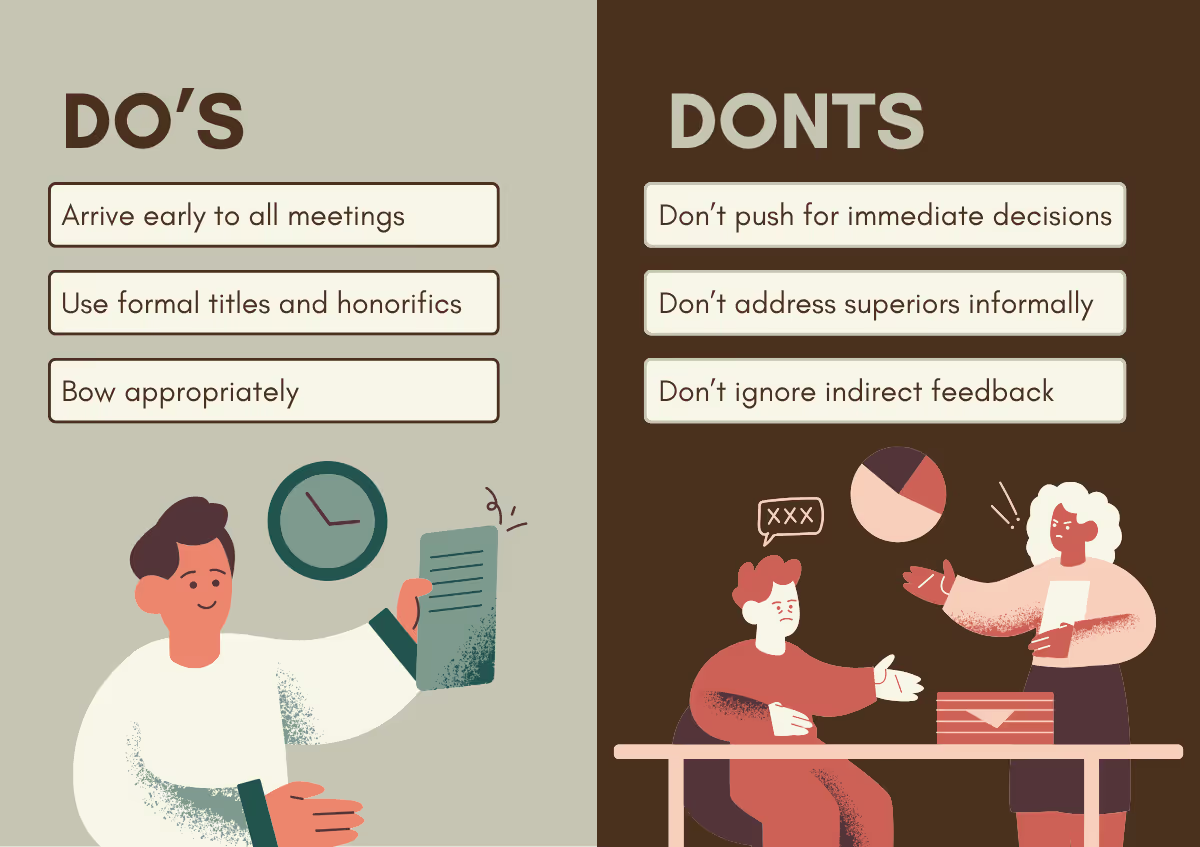
Success in the Japanese market isn’t just about having a strong product or service — it’s about understanding the culture, adapting your approach, and showing respect in every interaction. While formalities, etiquette, and relationship-building may seem secondary to business goals, they are integral to achieving them in Japan.
Even small gestures carry meaning for foreign professionals and companies entering the Japanese business environment. A misstep in tone, timing, or behavior can unintentionally undermine credibility, while a well-timed bow or thoughtful pause can help build long-lasting trust.
This section offers a practical summary of key behaviors to adopt — and avoid — to ensure your conduct aligns with Japanese expectations and enhances your professional reputation.
Do’s
- Arrive early to all meetings to show respect and preparation.
- Use formal titles and honorifics until invited to do otherwise.
- Bow appropriately based on context and hierarchy.
- Exchange business cards (meishi) with both hands, and treat them carefully.
- Observe silence and pauses in conversations — they often hold meaning.
- Build long-term trust through consistency, not urgency.
- Engage in social settings when invited — it strengthens professional bonds.
- Speak and write with formality and avoid humor or slang.
- Hire local talent or advisors to navigate cultural and regulatory nuances.
Don’ts
- Don’t interrupt — wait for your turn to speak.
- Don’t push for immediate decisions — respect the consensus process.
- Don’t address superiors informally or skip them in meetings.
- Don’t write on or mishandle business cards — they represent the person.
- Don’t assume a “yes” means agreement — it may simply mean acknowledgment.
- Don’t make meetings overly casual — Japanese business culture favors formality.
- Don’t ignore indirect feedback — subtle cues often say more than words.
- Don’t focus only on contracts or short-term deals — relationships come first.
It's not just behavior that needs to adapt—your digital marketing should, too.
Japan’s consumer landscape is unique, shaped by a distinct blend of tradition, digital maturity, and trust-based communication. This makes digital strategies like link building markedly different from approaches used in Western markets. Building authority in Japan requires long-term thinking, culturally appropriate content, and strong local relevance.
To explore how successful link-building strategies differ in Japan and what that means for your SEO efforts, read our blog: How Link Building Works in Japan.
Conclusion: Bridging Cultures for Business Success

Successfully navigating Japanese corporate culture requires more than just surface-level understanding—it calls for genuine local insight and thoughtful adaptation. From hierarchical decision-making to the subtle art of reading the room, every interaction carries unspoken rules that shape relationships and outcomes. Partnering with local experts ensures foreign companies can approach these nuances with confidence and clarity.
By embracing Japan’s deeply held values—respect in communication, punctuality, harmony in group dynamics, and even the social significance of after-work gatherings—foreign businesses can build trust and credibility. These practices aren't just traditions; they’re the foundation of long-term, stable partnerships. Aligning with them shows commitment, humility, and cultural fluency—qualities that resonate strongly in the Japanese business world.
Understanding and integrating into Japan’s unique business environment helps foreign companies overcome friction points, enhance collaboration, and align more closely with market expectations. When strategy meets cultural empathy, results follow—not just in performance, but in reputation and long-term growth.
Key Takeaway: Culture Comes First, Business Follows

Japan is a market of high standards, long-term thinking, and deeply embedded cultural expectations. Success here isn’t about adjusting a pitch — it’s about adjusting your mindset and behavior. Every detail matters, from bowing correctly to reading the air in meetings, from quiet dinners that build trust to marketing messages that reflect Japanese values.
For foreign companies, the difference between friction and progress often lies in cultural fluency. Understanding Japan’s business etiquette is not a formality—it’s your entry point. Mastering these customs isn’t about perfection; it’s about respect. Show that, and the market will open in return.
Curious how cultural understanding also shapes hiring strategies?
Read our blog on Why Outsourcing in Japan Works to see how foreign companies are navigating local expectations—both cultural and legal—through smart, localized workforce solutions.
Ready to Enter Japan the Right Way? Let IGNITE Guide You

We don’t just understand Japanese business culture at IGNITE — we live it.
We’re a multilingual digital marketing team based in Osaka, working at the intersection of culture, communication, and commerce. Whether you need to localize your website, launch a resonated campaign, or adapt your business strategy for Japan, we act as your in-house partner, not just an agency.
- We initiate with market insights.
- We localize across languages and cultures.
- We scale through data-driven, high-performance marketing.
Want to make a lasting impact in Japan? Contact IGNITE Today! Let’s build the bridge together.




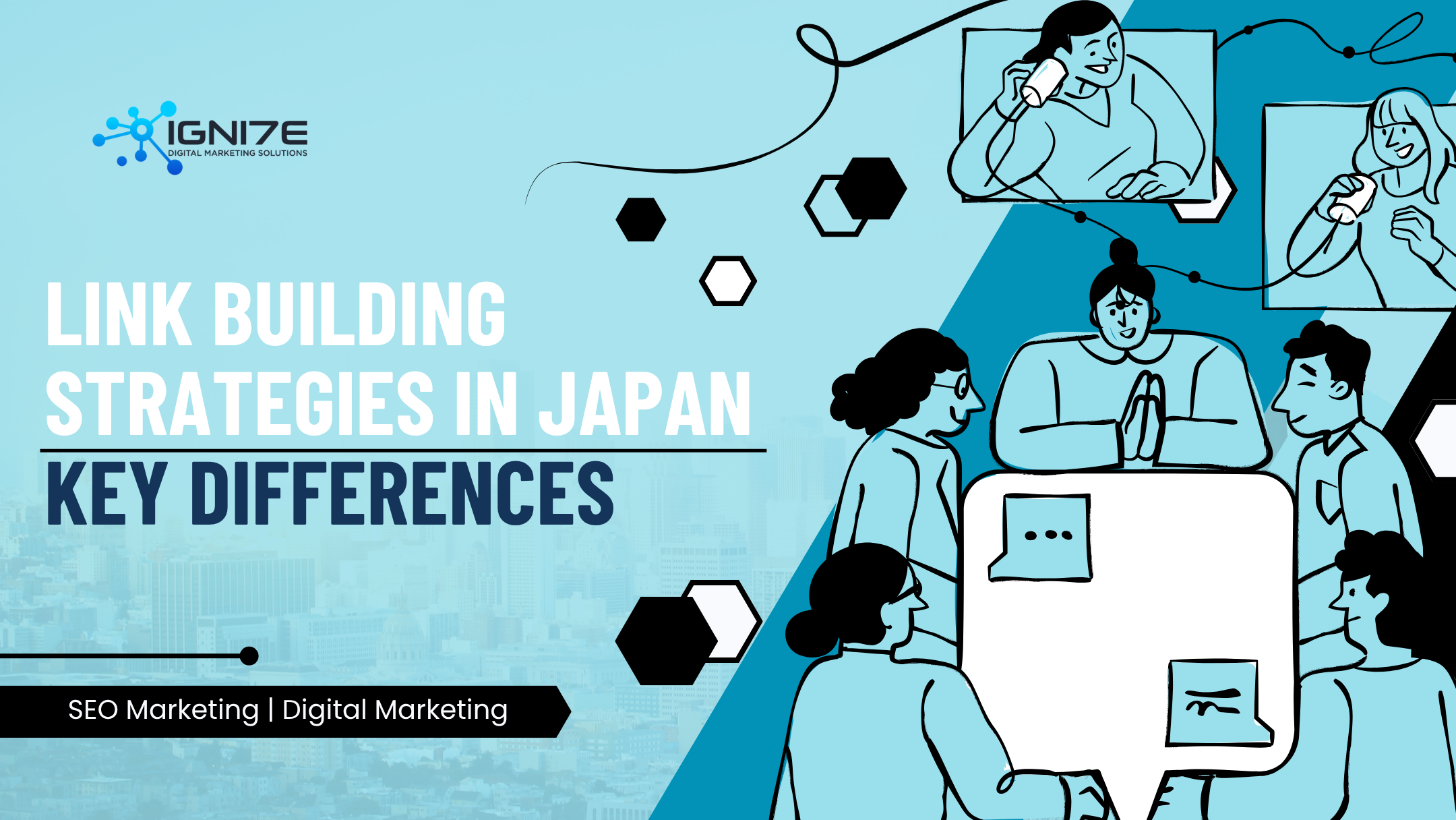





%20for%20Success%20in%20Japan_%20Essential%20Insights.png)



